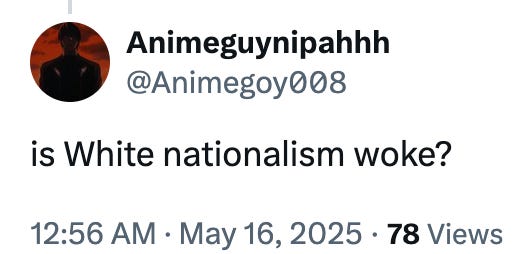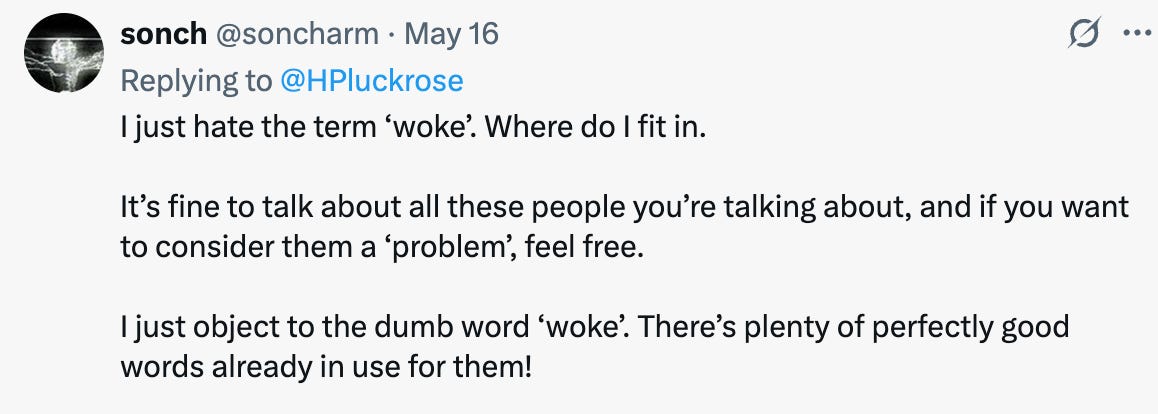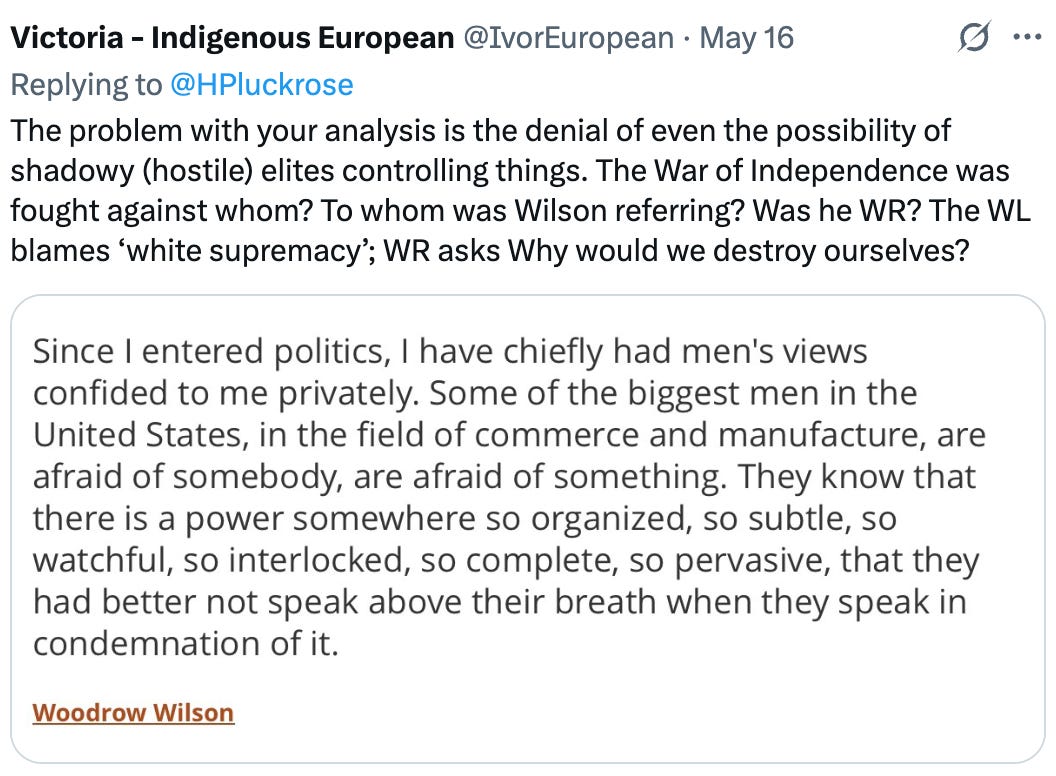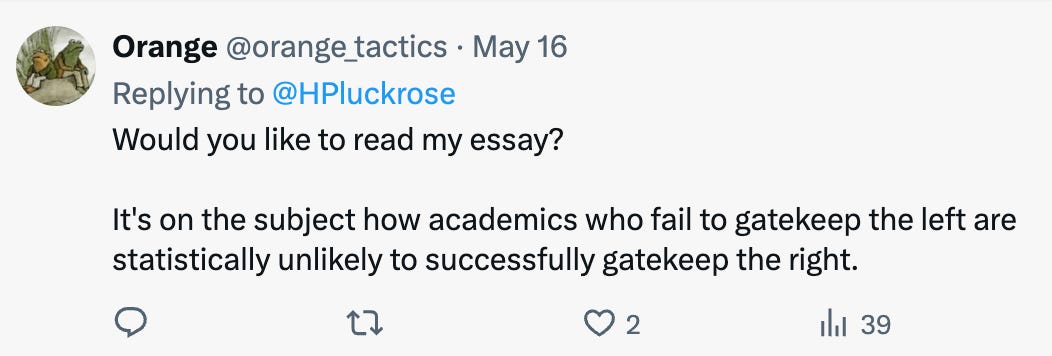Response To Criticisms of My Piece on the "Woke Right"

(Audio version here)
The Overflowings of a Liberal Brain goes out to nearly 5000 readers! We are creating a space for liberals who care about what is true on the left, right and centre to come together and talk about how to understand and navigate our current cultural moment with effectiveness and principled consistency.
I think it is important that I keep my writing free. It is paying subscribers who allow me to spend my time writing and keep that writing available to everyone. Currently 3.6% of my readers are paying subscribers. My goal for 2025 is to increase that to 7%. This will enable me to keep doing this full-time into 2026! If you can afford to become a paying subscriber and want to help me do that, thank you! Otherwise, please share!
My last piece drew considerable attention on X. I am not currently using the platform because it is bad for me and I don’t have access to my account which is being managed by a friend. Many of the comments are simply insulting or insane, of course, but some, even when expressed rudely, have substance that can be responded to in good faith.
I will take three big repeated objections first - Isn’t “woke” left-wing by definition? Is social constructivism really an issue on the right? Is the woke right really an evolution of postmodern thought? - and address those in most detail before giving some more concise answers to other smaller, but nevertheless repeated objections.
Complaints about people using a term that emerged in a left-wing context and applying it to a phenomenon on the right are very common and Joshua gets at the root of it by speaking of primary characteristics and secondary characteristics. To many on the right, the essential characteristic of wokeness is that it is left-wing and the particular approach it takes to knowledge, power and language are very much secondary. That ‘woke’ is left-wing or progressive has never been the primary concern to me and cannot be to anybody else who is themselves left-wing or progressive. I share the stated aims of the Critical Social Justice movement to oppose racism, sexism, homophobia and other bigotries. I believe their approach is wrong. It is illiberal and frequently detached from reality. Many on the right also find these traits to be a particular problem and I suspect they are what have alienated many from the left and caused them to vote right.
I, personally, have always been very clear about this and my biographies everywhere say “I want people to value evidence-based epistemology and consistently liberal principles".” Like so many others, I care about what is true and about letting people believe, speak, live as they see fit provided it does not harm anybody else nor deny them the same freedoms. When I started writing publicly, I criticised religion for its epistemology and resultant unevidenced truth claims and its illiberal goals. I then moved into criticising postmodernism and its evolution into Critical Social Justice (woke) on the same grounds. This has always been primary for me and so I was bound to criticise the rise of the illiberal, postmodern, populist faction of the right that has, with justification, become known as the ‘woke right.’
This complaint is, I think, a variation on that.
People are condemning me for criticising the way in which people go about advocating for their right-wing or left-wing political stance rather than the stance itself. This is a criticism often made of liberals because we really do think it matters that conflicts on political issues are resolved by productive debate. This requires a society that protects freedom of belief and speech and actively promotes the free exchange of ideas, using arguments that are evidenced and reasoned. We don’t tend to believe that the ends justify the means and, in fact, often believe that the ‘means’ by which a society is governed, both legally and culturally, are more defining of that society than many specific policy decisions that result from this. I have often said that liberalism is a ‘higher order value’ than either right or left wing party politics because it is defining of the system of government and of the culture of Western liberal democracies, and we should strive to preserve that above all. The same is true of evidence-based epistemology. It is urgently essential that we conserve expectations and norms that truth is defined as ‘that which corresponds with reality’ and push back the drive to exist in the self-serving group narratives which care little for reality and which define our ‘postmodern turn.’
I did criticise people for their mentality - way of thinking - and epistemology - way of establishing what is true - and argued this to be what is postmodern or woke rather than for whether they hold right-wing or left-wing beliefs. It is simply not true to say that criticising people for the way they go about addressing issues - authoritarian or liberal, evidence-based or narrative-based, reasoned or emotive etc. - rather than the ends they seek to achieve is attacking them as a person however. If we accept that people can choose which political stances they take and which parties they vote for, we must also accept that they can choose whether to advocate for them in a liberal, reasoned and evidenced way or in an authoritarian, fallacious and narrative-driven one. To say that someone is unjustly attacking a person, surely this must mean attacking them for traits that are unchosen like their appearance, intelligence, race or sex and not for their mentality or epistemology which we must assume they have some control over and can be persuaded to change?
There is some truth in this. The woke left are more likely to focus explicitly on the role of “socialisation” in the oppressive power systems they see and claim that we are inevitably socialised into being cis/heteronormative, imperialistic, patriarchal white supremacists without being aware of it while the woke right are more likely to posit knowing conspiratorial forces being at play. Nevertheless, there is a distinct tendency for both groups to believe that we are all being brainwashed and that the solution to this is to ban or penalise the opposing narrative and get their own into power to socially condition people in their own direction. (See Chris Rufo being most explicit about this). This is, at root, a commitment to social constructivism or, at least, a rejection of the liberal view that individuals can evaluate ideas for themselves and that it is by robust debate and criticism that bad ideas get replaced by better ones.
When it comes to gender roles, for example, the reality appears to be that men and women differ psychologically on average but that significant individual variation also exists. This indicates that we should not be surprised if men and women don’t make exactly the same choices in exactly the same numbers when free to make their own (see gender-equality paradox) but claims that differing traits on average mean that individual men and women have ‘natural roles’ will always be false of millions of individuals. The liberal stance is that we do everything we can to make sure that nobody is constrained into a gender role and accept that all fields of work (including home-making) will have both men and women naturally inclined to be in them, that some men won’t be that masculine, some women not particularly feminine and same-sex attracted people exist and nobody needs to moralise about this, and then just leave people alone without trying to socially engineer people into anything.
Social constructivism is particularly associated with the left and some social progressives and feminists, in particular, have taken a blank slatist view that no psychological differences exist at all and that all disparities which affect women are a result of cultural conditioning. (Kathleen Stock addresses this well). Denial of psychological sex differences and attempts to make them vanish via social engineering is a radical stance that does not work well with reality. However, some social conservatives are equally inclined to deny the reality of individual variation and take a stance that when men and women diverge from gender roles, it is because women have been culturally conditioned to believe they want rewarding careers when we’d actually be much happier confining ourselves to the domestic and child-rearing realm and men have been emasculated, usually by feminists.
Denials of adaptive aspects of human nature or of variations within it are certainly not new. Humans seem to have a tendency to believe they can overrule the reality of how humans work if they only push their own narratives of what makes for a good society strongly enough. However, the postmodern turn has caused the current manifestations of this to have a distinct flavour, centring on a claimed ability to be uniquely able to see through political systems of power and privilege and a victimhood narrative. The concept of the ‘red pill’ in the movement on the right works almost identically to the concept of ‘woke’ on the left In practice, I suspect the association of social constructivism with the left has more to do with the academic left explicitly using this term than the conspiratorial right being less inclined to believe we are all being socialised into harmful and false concepts of knowledge by powerful forces, and all need to wake up.
This gets at another good point I should have addressed. To what degree does the current “woke-like” behaviour on the right simply “co-opt” the “woke” phenomenon on the left? There's a 'chicken and egg' problem with trying to argue about the extent to which the woke right is directly influenced by postmodern thought. We can see quite a clear ‘borrowing’ of Critical Theory from both Marxist and Postmodern thought in the work of Chris Rufo and Christian Nationalists identified by Neil Shenvi (I am not suggesting Rufo embraces the white supremacist views of the individuals addressed by Shenvi and have been pleased to see him push back at them) and interestingly, I would argue that they use more directly Marxist ideas than the woke left (that is an argument for another day). Nevertheless, I do not believe many of the woke right have been reading much critical theory. Neither, however, have many of the woke left activists!
Postmodern ideas of the 1960s and 70s underlie the adapted theories - postcolonial, queer, critical race etc. - that emerged in the late eighties and early 90s and then later, around 2010, were adapted again, condensed and reified into Critical Social Justice (woke) scholarship and activism. (This is complicated and tedious to many people so we had to write a book about it). Woke left activists have been operating on a bastardised and activist-orientated variation of postmodern ideas and many of them do not appear to know their origins and may even deny that they are postmodern, although their ancestry can be shown quite clearly. Many are working on a ‘pop, culture’ version of this (Titania McGrath parodies this well) and it is this which has penetrated so much of mainstream culture, become familiar to us and given us the flavour of ‘woke.’
Postmodernism was, at root, a reaction against the shift towards reason, evidence and liberalism that followed on from the Enlightenment, and established systems in which correspondence with reality and reasoned arguments between people who disagree and can disconfirm each other became an expectation. Counter-Enlightenment thinkers have always been trying to break this down and the postmodernists were the ones who most successfully managed to establish and institutionalise their variation on it. However, other kinds of Counter-Enlightenment thought have also long existed on the right. These have included a defense of faith-based epistemology connected to Christianity and a pragmatic concept of truth which holds that something is true if it is useful to believe it to be true (we see elements of both of these in the work of Jordan Peterson). Therefore, there has always been a Counter-Enlightenment philosophy on the right that has elements in common with postmodernism and a form of popular activism which is rooted in those intuitions and principles without drawing on them explicitly. This does muddy the waters and create some qualitative differences in the woke left and woke right (another essay for another day)!
There is also, I would argue, a significant degree of direct co-option from contemporary woke-left activists by woke right ones on that popular cultural level. The woke left did such a good job of normalising identity-based standpoint epistemology, prioritisation of lived experience (perception) as a superior form of knowledge to that which is evidenced and reasoned, opposition to liberalism and beliefs in invisible systems of power and privilege oppressing the underdog that these could very easily be picked up and reversed in the service of illiberal right-wing populism. I think it is true to say that the woke left played a significant role in breaking down expectations that had been precariously holding back the Counter-Enlightenment thinking that had always been present on the illiberal right and provided grooves for the woke right to slot into.
This is all very messy, but, unfortunately, humans, intellectual thought and popular political movements are! I don’t think the fact that much of the rise of the woke right was enabled by being able to fit their own narratives quite neatly into the grooves made (or deepened?) by the woke left makes them any less woke-like. Nor do I think the fact that they do not embrace this term themselves makes it fit them any less well.
Not necessarily, no. This depends whether you wrap it up in postmodern woo or not. There is a lot of historical revisionism, mythmaking and narratives about oppressive systems of power and victimhood going on in ethnonationalist discourse as well as wholesale borrowing from critical theories, and Neil Shenvi is the person who has been addressing this most rigorously. He writes,
[I]n 2020, I (descriptively, not pejoratively) defined left-wing wokeness as follows:
1) society is divided into oppressed/oppressor groups along lines of race, class, gender, sexuality, etc via 2) hegemonic power. But privileged people are blind so 3) we need to defer to the lived experience of the marginalized to 4) dismantle unjust systems.
A few months ago, I argued that the ideology of the “Dissident Right” could be defined in precisely analogous terms:
1) society is divided into straight White men and their enemies via 2) hegemonic norms (“the Longhouse,” “postwar consensus,” “Judeo-Christianity”) but normies are blind so 3) we need to redpill them to 4) retake the West.
However, one could be a white nationalist by simply saying “I think whites are the superior race and we should throw out all inferior races” and there’s nothing woke about this. Stupid and immoral? Yes. Woke? No.
I share this sentiment to some extent. I have disliked the word ‘woke’ generally and only recently accepted that it is now a thing and also does usefully get at the ‘believing oneself to be uniquely enlightened while everybody else is asleep or a sheep’ aspect. However, ‘postmodern left and ‘postmodern right’ or ‘postmodern left and post-truth right’ also work if you want to get at the problems with truth, power and language/narratives without using the term ‘woke.’
This one has arisen a great deal. James Lindsay has been leading the charge on the problem of the ‘woke right’ and many people seem to think my criticisms have much similarity with his. This is hardly surprising, however, given that we developed a model of the evolution of postmodern thought into contemporary wokeness together. I would be astonished if he did not see the same indicators of postmodern thought that I did. Further, it is unsurprising that he identified them and broke them down first as he has been engaging closely and in a cooperative way with the MAGA right while I have remained focused primarily on fixing the left from the left. Also, even if I did not want to be associated with Jim, it would be both irrational and cowardly for me to pretend that a right-wing phenomenon I see clearly and am very concerned about is not happening.
No. I do not deny the possibility of shadowy, hostile elites controlling everything. This is, however, an extraordinary claim that would require extraordinary evidence, not unhinged conspiratorial narratives. I have so far been accused of being in the pay of (among others) Christian Nationalists, the Koch brothers, the WEF, Big Pharma and ‘the Jews’ and I know none of these to be the case. There is some very black and white thinking going on here. An acquaintance once told me that the difference between us is that he knows the government is lying to us and I don’t. This is not the difference. Corruption and ‘spin’ always exist and we always need to be alert for them, demand government transparency and exercise critical thinking. The narratives of the woke right are……not that.
This is also raised a lot and contains two issues. First, there is the assumption that if we say that one problem exists, it indicates that we do not recognise any other to exist or, secondly, that if we discern the most serious problem to exist on one side, we should focus solely on that problem and ignore or condone problems on the other side. In answer to whether I believe the problem of the woke left to be serious, I submit everything I have been doing for the last decade. It is vital to recognise the importance of ethical consistency. There is also a decided tendency to see problems of illiberalism as much more serious on the other side than on one’s own whether that is justified or not. Those sympathetic to the woke right will say, “But this is just a few fringe outlets and individuals while the left has control of the institutions and media” while those sympathetic to the woke left will say, “But this is just a few mad academic papers and Too Online activists while the right has the power of the POTUS and control of the biggest social media platform on its side.” This problem is addressed by being particularly conscientious about opposing illiberalism on your own side. This also strengthens your own side.
This is simply an assertion of disagreement with me that illiberal conservatism is unethical from someone who presumably believes it to be the ethical way to go. He gives no argument for this, but simply deems me woke-like for not thinking so. The conflation of liberalism with wokeness is a big problem coming from the woke right just as the conflation of liberalism with conservatism is a problem on the woke left. It is not at all ‘woke’ to say that some ideas are ethical and some are a problem. Anybody who does not think some ideas are good and others bad is a relativist so radical that I have never yet met one. Liberalism works on the presumption that some ideas are good and others are bad and that the way to establish which are which is to enable viewpoint diversity and encourage robust debate. The woke differ radically from liberals in that they do not believe debating ideas on their merits can be productive and instead fight to demolish dominant narratives they don’t like and install their own in their place with little regard for truth or for the value of viewpoint diversity and robust debate. Instead, they believe that everybody who disagrees with them is a bad person and assume them to be ‘on the other side.’
This is a variation of “You think you’re always right” which is incoherent. People have to think the values and beliefs they themselves hold are right, because as soon as they believe them to be wrong, they cannot be said to hold them anymore. I can’t say I am a fan of neoliberalism or neoconservatism but I certainly believe that evidence is the way to establish what is true and liberalism is the way to govern a society. Anybody who wants to argue against this (which I defend their right to do, of course) will need to make their case themselves rather than saying what amounts to “Unless you can show the ways in which the positions you believe to be right are, in fact, wrong, you are biased and should be dismissed.” I am biased. So is everybody. This is why viewpoint diversity, freedom of speech and an expectation that people can argue strongly and disconfirm each others views are so important.
Yes, I could absolutely fail to make any impact on the woke right. Liberal, empirical, rational criticisms of the illiberalism and irrationalism on the woke left did not result in a surge of recommitment to evidence-based epistemology and consistently liberal principles. It is not at all clear that the woke right are likely to be any more open to those values. The fruits of the Enlightenment and the principles underlying modern Western liberal democracies could, in fact, die. They were something of an anomaly for humans in the first place given the evidence that we do not seem to be a species naturally inclined to prioritise what is true over self-serving narratives and protect the rights and freedoms of those with whom we disagree. They definitely will die if people don’t even try to conserve them, however. That would be bad, so I suggest we keep trying.
Yes. Yes, I do.















Good post, needs more Matt McManus:
https://www.amazon.com/Rise-Post-Modern-Conservatism-Neoliberalism-Reactionary/dp/3030246817
I forget if I mentioned this here before, but I think the phrase "woke right" is similar to "fundamentalist atheist". Both of those phrases sound intentionally oxymoronic (and sometimes are explicitly meant to be so), and they both imply that one is mirroring the errors of their opponents.
Someone characterized as "fundamentalist atheist" is supposed to be someone who engages in the same kind of sloppy thinking habits that fundamentalists do. Someone described as "woke right" similarly adopts the kind of slipshod reasoning and other related negative attributes seen on the "woke" left.
Both phrases imply a sort of hypocrisy.